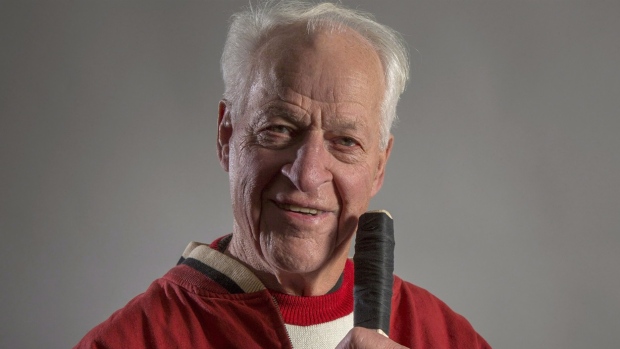Jun 10, 2016
Hodge: There was only one "Mr. Hockey"
There could only be one “Mr. Hockey”, and no one ever thought it could be anyone other than Gordie Howe. After all, you’re not “Mr. Hockey” if it has to be explained why, or if someone else finishes a close second. TSN's Dave Hodge remembers one of hockey's true legends.
By Dave Hodge

There could only be one “Mr. Hockey”, and no one ever thought it could be anyone other than Gordie Howe.
After all, you’re not “Mr. Hockey” if it has to be explained why, or if someone else finishes a close second.
How perfect was the “Mr. Hockey” family when the father could be playing professionally with two of his sons as teammates while his wife managed their business affairs?
On the ice, Gordie Howe was an intimidating presence. He made his elbows famous.
Off the ice, he was gentle and gracious and politely shy, unless he was telling a joke or reacting to one. He loved to do both.
Although I obviously never faced him on the ice, he did intimidate me off it...sort of.
Gordie’s first retirement came in 1971, which happened to be my first year as host of Hockey Night in Canada. My debut performance was scheduled to include Gordie Howe as the intermission analyst.
To say the least, I was scared for more reasons than I could list, but meeting a legend, working with him and pretending I belonged in the same room and on the same TV screen was a pretty good start to a sleepless night.
I didn’t have time to worry about impressing the audience. I had to pass a Gordie Howe test first.
Except I didn’t get to use all my research and the questions I had prepared for him, just yet.
The night before the Toronto Maple Leafs’ 1971-72 season opener, club owner Stafford Smythe died, and the game, together with the HNIC telecast, was postponed. I received that notice in a 5:30 a.m. phone call. It didn’t wake me up, for I was already busy putting finishing touches on my Gordie Howe file.
Days later, the Leafs played and Hockey Night in Canada introduced me as its new host and the intermission analyst was another newly-retired legend, George Armstrong.
Gordie Howe had a previous commitment, and it would be later in the season that I first appeared with him as a colleague.
I was somewhat less intimidated than I surely would have been on the original date. I don’t remember much about my work with George - it was all a blur.
When Gordie Howe finally did retire, for good, he was 52 and I was looking forward to my 10th year with HNIC.
The timeline spun my head.
Interviewing Gordie many times afterward was always a pleasure. The first time would have included a recap of his great career with the Detroit Red Wings.
And I would have known to ask him what he might do next.
Little did I, or anybody, know what Gordie Howe would do next, how he would follow one Hall of Fame-worthy career with a second one, how he would amaze even those who had come to believe that he could do anything with a stick and a puck, and as it turned out, at almost any age.
That Gordie died on the day Muhammad Ali was buried must have been a coincidence, yet a higher power could have been involved.
Listen to eulogies and read obits for one, and you will not escape the realization that they apply to both. They were “The Greatest” and “Mr. Hockey” when we watched them play, and they proved it all over again when they couldn’t do that.
The sports world I have covered for more than 50 years always included Howe and Ali. Gordie played his first NHL game the year after I was born. Ali was four years old. It doesn’t include two of its most amazing athletes any longer, except for the special places it made for them, places that won’t be filled by any others like them.

